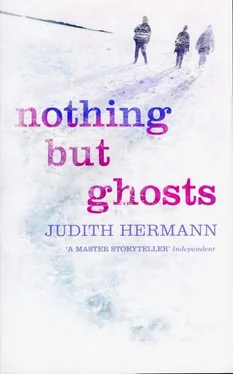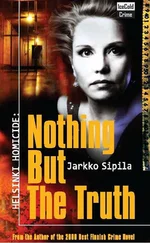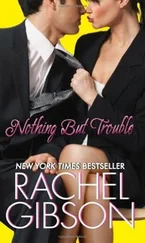The next morning she took me to the railway station; it had turned cold, windy; we hugged each other on the platform; the train was already there, doors open. ‘For heaven’s sake, what are you going to Paris for?’ Ruth said. ‘What are you going to do in Paris?’ I got on and leaned out of the open compartment window. Ruth was wearing a little black cap under which her hair had disappeared; her face looked stern. She put her hands into her coat pockets and hopped from one foot to the other; she said, ‘You haven’t told me yet what you think of him.’ Her voice sounded no different than usual. The conductor blew his whistle; the doors slammed shut. I took a breath, and then I said, ‘I don’t think he’s right for you.’ Ruth said, ‘Oh.’ I wasn’t sure she had really heard me. The train started. Ruth remained standing there; I looked out of the window as long as I could still see her slender figure in the light-coloured coat, the dark spot that was her cap; she didn’t wave. Then she was gone.
I had never travelled anywhere with Ruth. There was one winter when the temperature dropped far below freezing, and we took the S-Bahn out to the Grunewald and walked across the frozen lake; neither of us was wearing the right kind of shoes. That was our biggest excursion. Every summer we lay on the grass in the park and talked about going to Greece, Italy or Sicily, to the sea, but we never did. She went to Portugal with B. and to Poland with J. and to Italy with F. I flew to New York and London and travelled through Morocco and Spain. We didn’t miss each other during those times; maybe we had different expectations and weren’t suitable travelling companions.
In Paris I took a room in a small hotel in the north of the city, in the African quarter; for a week I walked through the city from morning to night; it was cold, the Seine was muddy and green; it rained constantly and I was freezing. What in the world was I doing in Paris?
There were long queues outside the Louvre, so I decided to forgo that pleasure and went instead to a small museum on the Rue de Cluny where there was an exhibition of talismans of twelfth-century pilgrims, tiny blackish pendants: a wheel, a Madonna, a frozen teardrop. For a long time I stood before the warmly lit exhibition cases and felt comforted without being able to say by what.
In the Metro it smelled of tobacco, metal and rain-damp coats; people’s faces were reserved and beautiful – Black Africans, Chinese, Indians. On my way back to my hotel at night there were men standing in doorways, whispering words in a foreign language behind me.
At midnight, once I was certain I wouldn’t be interrupted, I took a shower in the communal bathroom down the hall. I stood on the slippery tiles and let the hot water course over me till my skin became red and wrinkled. I thought about him, his name, and tried to understand – him, myself, Ruth, the difficulty of the situation. I couldn’t even have said what it was that was difficult. I miss you. I missed him, I kept thinking of him, of someone I didn’t know but someone I wanted to visualize. I tried again and again, but couldn’t assemble even his face from memory; there were only fragmented details, his eyes, his mouth, a gesture of his left hand – perhaps his voice was what I recalled best.
I tried to write a postcard to Ruth but couldn’t get beyond the first two words, ‘Dear Ruth…’ The rain kept falling on the silvery roofs. At night, I lay on the hotel bed smoking a cigarette in the darkness, listening to the reassuring foreign sounds from the street and tried to answer Ruth’s question at the railway station, For heaven’s sake what are you going to Paris for? Aloud, I said, ‘Ruth, maybe it’s that you keep searching for yourself and can really find yourself over and over again, and that I, on the other hand, want to lose myself, to get away from myself. And I can do that best when I’m travelling and sometimes also when I’m loved.’ I would never have spoken to Ruth like that, and I thought it would shock me to hear myself say it out loud, but I wasn’t shocked. My voice sounded strange in the dark.
The next morning I had breakfast at the mosque near the Natural History Museum, mint tea and sticky pastry. I was the only one sitting there; the windows were open and rain was getting in, and sparrows flew inside and up to the ceiling and launched themselves from there. I lost all sense of time.
A Black African came up to me at the Place de la Madeleine; he wanted money for stamps so he could mail his dissertation to the university; the university accepted only dissertations that arrived by mail; he had sent all his money to his family in South Africa. I gave him ten francs; he said, ‘Not enough’, I gave him twenty, then thirty; he continued to hold out his hand, looking at me as though I should be paying for something quite different. I gave him all the money I had in my trouser pockets, much too much; it was ridiculous. He handed me a piece of paper and a pencil and asked me to write down my address; he’d send me the money as soon as he found work. I wrote down an imaginary address that I immediately forgot, and he put the piece of paper in his pocket and mouthed the question: ‘What is your name?’ Then he walked off; I watched him go. The expression on his face was dignified and contemptuous; suddenly I knew that I had to leave, that I was no longer safe here.
People were streaming through the Gare du Nord; gypsy women squatted on baggage carts with sleeping children in their laps or draped over their shoulders. The letters on the information board announcing train departures and arrivals fell into a jumble, flashed out the names of cities and far-away places, and then disappeared again. I felt a longing, or perhaps I was running a fever; I couldn’t tell which any more. I thought, ‘Keep on going, keep on going, go away, as far as possible.’
The Asian woman in the glass ticket booth stared at me. ‘Berlin,’ I said, ‘a ticket for Berlin, please,’ and now the feeling in my stomach was clearly fear. I dropped my last coins into a pay phone and dialled Ruth’s number. I wanted to say, ‘Ruth, I’m taking a train home now, and then something will be decided.’ I hoped she would say, ‘I know,’ and maybe add, ‘Get lost,’ but she didn’t pick up. The answering machine came on, and I held the receiver out into the station concourse, recording the voices, the announcements on the public address system, and the sounds of the moving trains; then I hung up.
Oddly enough, it wasn’t me, it was Ruth who had said, ‘I’d like to be you.’ Not the other way around.
Late that evening, I arrived in Berlin. The apartment was stuffy and still, totally strange to me – whose bed was that? the chair? the books, papers, teacups, the shoes in the hall, whose were they? Ruth’s voice on the answering machine, three calls, the first one affectionate and yearning – ‘I miss you,’ she said; in the background someone seemed to be walking about in the room. In the second call she was short, ‘Are you there? Hello? Are you back?’ then she hung up. The third time it sounded as though she had been crying; her voice trembled; she said I should call her when I got back, whenever, even in the middle of the night.
I unpacked my suitcase, hung in the wardrobe the things I had bought with Ruth but hadn’t worn, not even once, opened all the windows and went to bed. I slept briefly yet soundly. The next morning was windy and grey; I went shopping, then back to the apartment, read a newspaper, did laundry, looked through the mail. And throughout, I watched myself from outside myself, from a distance, from far away, moving about lightly.
In the evening the phone rang. I let it ring four times even though it was right next to me; only then did I pick up the receiver. ‘Oh, you’re there,’ Ruth said. Her voice sounded so close it was as if she were standing beside me. I said, ‘I just got back.’ She said, ‘You don’t have to apologize.’ I said, ‘No, why should I?’ Then I had to laugh. Ruth did not laugh. She burst out crying, and I let her cry. I just sat there and looked out of the window – the night sky over the park, no moon, no stars. I imagined Ruth in her room, in the blue light of the car park sign, the silver ashtray on the table, the photo on the windowsill. Ruth’s hair, loose, her teary face. I said, ‘Ruth, oh Ruth.’ She went on crying for quite a while. Then she stopped, blew her nose; we were silent, then she said, ‘How was Paris?’ I said, ‘Nice.’ She said, ‘It’s over, you know. The thing with Raoul, I mean. It’s over,’ and I said, ‘Why?’ and she said, ‘Why. Good question.’
Читать дальше












